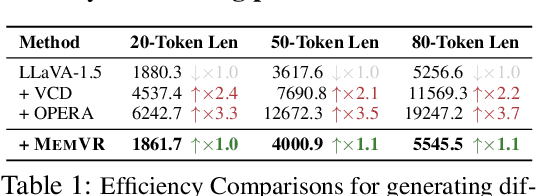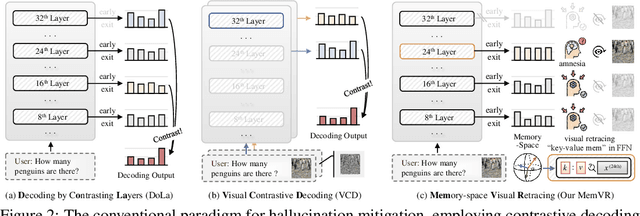Kening Zheng
GM-PRM: A Generative Multimodal Process Reward Model for Multimodal Mathematical Reasoning
Aug 06, 2025Abstract:Multimodal Large Language Models (MLLMs) demonstrate remarkable capabilities but often struggle with complex, multi-step mathematical reasoning, where minor errors in visual perception or logical deduction can lead to complete failure. While Process Reward Models (PRMs) offer step-by-step supervision, existing multimodal PRMs are limited to being binary verifiers that can identify but not correct errors, offering little explanatory power. To address these deficiencies, we introduce the Generative Multimodal Process Reward Model (GM-PRM), a novel paradigm that transforms the PRM from a passive judge into an active reasoning collaborator. Instead of a simple scalar score, GM-PRM provides a fine-grained, interpretable analysis of each reasoning step, evaluating its step intent, visual alignment, and logical soundness. More critically, GM-PRM is trained to generate a corrected version of the first erroneous step it identifies. This unique corrective capability enables our new test-time inference strategy, Refined Best-of-N (Refined-BoN). This framework actively enhances solution quality by using the PRM's generated correction to guide the policy model toward a more promising reasoning trajectory, thereby improving the diversity and correctness of the solution pool. We demonstrate that GM-PRM achieves state-of-the-art results on multiple multimodal math benchmarks, significantly boosting policy model performance with remarkable data efficiency, requiring only a 20K-sample training dataset. Our code will be released upon acceptance.
SAFEERASER: Enhancing Safety in Multimodal Large Language Models through Multimodal Machine Unlearning
Feb 18, 2025Abstract:As Multimodal Large Language Models (MLLMs) develop, their potential security issues have become increasingly prominent. Machine Unlearning (MU), as an effective strategy for forgetting specific knowledge in training data, has been widely used in privacy protection. However, MU for safety in MLLM has yet to be fully explored. To address this issue, we propose SAFEERASER, a safety unlearning benchmark for MLLMs, consisting of 3,000 images and 28.8K VQA pairs. We comprehensively evaluate unlearning methods from two perspectives: forget quality and model utility. Our findings show that existing MU methods struggle to maintain model performance while implementing the forget operation and often suffer from over-forgetting. Hence, we introduce Prompt Decouple (PD) Loss to alleviate over-forgetting through decouple prompt during unlearning process. To quantitatively measure over-forgetting mitigated by PD Loss, we propose a new metric called Safe Answer Refusal Rate (SARR). Experimental results demonstrate that combining PD Loss with existing unlearning methods can effectively prevent over-forgetting and achieve a decrease of 79.5% in the SARR metric of LLaVA-7B and LLaVA-13B, while maintaining forget quality and model utility. Our code and dataset will be released upon acceptance. Warning: This paper contains examples of harmful language and images, and reader discretion is recommended.
Look Twice Before You Answer: Memory-Space Visual Retracing for Hallucination Mitigation in Multimodal Large Language Models
Oct 04, 2024



Abstract:Despite their impressive capabilities, Multimodal Large Language Models (MLLMs) are susceptible to hallucinations, especially assertively fabricating content not present in the visual inputs. To address the aforementioned challenge, we follow a common cognitive process - when one's initial memory of critical on-sight details fades, it is intuitive to look at them a second time to seek a factual and accurate answer. Therefore, we introduce Memory-space Visual Retracing (MemVR), a novel hallucination mitigation paradigm that without the need for external knowledge retrieval or additional fine-tuning. In particular, we treat visual prompts as supplementary evidence to be reinjected into MLLMs via Feed Forward Network (FFN) as key-value memory, when the model is uncertain or even amnesic about question-relevant visual memories. Comprehensive experimental evaluations demonstrate that MemVR significantly mitigates hallucination issues across various MLLMs and excels in general benchmarks without incurring added time overhead, thus emphasizing its potential for widespread applicability.
Reefknot: A Comprehensive Benchmark for Relation Hallucination Evaluation, Analysis and Mitigation in Multimodal Large Language Models
Aug 18, 2024



Abstract:Hallucination issues persistently plagued current multimodal large language models (MLLMs). While existing research primarily focuses on object-level or attribute-level hallucinations, sidelining the more sophisticated relation hallucinations that necessitate advanced reasoning abilities from MLLMs. Besides, recent benchmarks regarding relation hallucinations lack in-depth evaluation and effective mitigation. Moreover, their datasets are typically derived from a systematic annotation process, which could introduce inherent biases due to the predefined process. To handle the aforementioned challenges, we introduce Reefknot, a comprehensive benchmark specifically targeting relation hallucinations, consisting of over 20,000 samples derived from real-world scenarios. Specifically, we first provide a systematic definition of relation hallucinations, integrating perspectives from perceptive and cognitive domains. Furthermore, we construct the relation-based corpus utilizing the representative scene graph dataset Visual Genome (VG), from which semantic triplets follow real-world distributions. Our comparative evaluation across three distinct tasks revealed a substantial shortcoming in the capabilities of current MLLMs to mitigate relation hallucinations. Finally, we advance a novel confidence-based mitigation strategy tailored to tackle the relation hallucinations problem. Across three datasets, including Reefknot, we observed an average reduction of 9.75% in the hallucination rate. We believe our paper sheds valuable insights into achieving trustworthy multimodal intelligence. Our dataset and code will be released upon paper acceptance.
Refiner: Restructure Retrieval Content Efficiently to Advance Question-Answering Capabilities
Jun 18, 2024



Abstract:Large Language Models (LLMs) are limited by their parametric knowledge, leading to hallucinations in knowledge-extensive tasks. To address this, Retrieval-Augmented Generation (RAG) incorporates external document chunks to expand LLM knowledge. Furthermore, compressing information from document chunks through extraction or summarization can improve LLM performance. Nonetheless, LLMs still struggle to notice and utilize scattered key information, a problem known as the "lost-in-the-middle" syndrome. Therefore, we typically need to restructure the content for LLM to recognize the key information. We propose $\textit{Refiner}$, an end-to-end extract-and-restructure paradigm that operates in the post-retrieval process of RAG. $\textit{Refiner}$ leverages a single decoder-only LLM to adaptively extract query-relevant contents verbatim along with the necessary context, and section them based on their interconnectedness, thereby highlights information distinction, and aligns downstream LLMs with the original context effectively. Experiments show that a trained $\textit{Refiner}$ (with 7B parameters) exhibits significant gain to downstream LLM in improving answer accuracy, and outperforms other state-of-the-art advanced RAG and concurrent compressing approaches in various single-hop and multi-hop QA tasks. Notably, $\textit{Refiner}$ achieves a 80.5% tokens reduction and a 1.6-7.0% improvement margin in multi-hop tasks compared to the next best solution. $\textit{Refiner}$ is a plug-and-play solution that can be seamlessly integrated with RAG systems, facilitating its application across diverse open-source frameworks.
 Add to Chrome
Add to Chrome Add to Firefox
Add to Firefox Add to Edge
Add to Edge